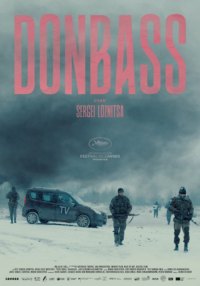
Anne Thompson, Indiewire про фільми-учасники Каннського МКФ, здатні змагатися за «Оскар» найкращому іншомовному фільму. «Донбас» Сергія Лозниці – один із претендентів.
Cannes plays a key role in foreign-language Oscar submissions around the world, but fall festivals are embracing more.
Where Cannes 2018 was light on red-carpet celebrities, the Official Selection offered many stars in the form of potential foreign-language award contenders. Each country has its own arcane rules for submitting films for the Foreign Language Oscar, but distributors scrambled to scoop up available titles and hope for the best.
Cate Blanchett’s jury had plenty of strong auteurs to assess, from Best Director Pawel Pawlikowski’s follow-up to Oscar-winner “Ida,” the Polish bittersweet period romance “Cold War” (Amazon Studios), starring incandescent breakout Joanna Kulig, and Kazakhstan’s “Ayka,” which won an acting award for Samal Yesyamova, to two poverty-row melodramas, Hirozaku Kore-eda’s “Shoplifters” — which won the Palme d’Or and a Magnolia deal and is Japan’s official Oscar submission— and Lebanese Nadine Labaki’s heart-tugging crowdpleaser “Capernaum” (Sony Pictures Classics), which scored the Jury Prize.
Italy will have to choose between “Gomorrah” director Matteo Garrone’s “Dogman,” which won Marcello Fonte Best Actor, and Alice Rohrwacher’s elegantly moving Best Screenplay winner, “Happy as Lazzaro” (Netflix).
Collecting no prizes were “The Wild Pear Tree,” which is Nuri Bilge Ceylan’s fifth Oscar submission from Turkey, rookie A.B. Shawky’s leper drama “Yomeddine” (Strand Releasing) a likely submission for Egypt, and opening-night title “Everybody Knows” (Focus Features), an entertaining family mystery from Oscar-winners Asghar Farhadi, Javier Bardem, and Penelope Cruz. The movie played well in France after Cannes, and is shortlisted by Spain.
South Korea has not had much luck with its Oscar submissions: since 1962 they have not scored one foreign-language nomination. Will they submit Cannes critical hit “Burning,” (winner of the FIPRESCI critics’ prize) from Lee Chang-dong? It could have used some jury awards.
Other films made a mark, including Un Certain Regard prize-winner “Border” (Neon), the official Swedish entry directed by Iran-born Ali Abbasi; the Belgian submission from rookie Lukas Dhont, the transgender ballerina drama “Girl” (Netflix), which won the Un Certain Regard performance award and the Camera d’Or; Benedikt Erlingsson’s “Woman at War” (Iceland); Best Director Sergei Loznitsa’s “Donbass,” the Ukraine submission, and Colombia’s official Oscar entry, drug-cartel adventure “Birds of Passage” (The Orchard), from co-directors Cristina Gallego and Ciro Guerra (whose “Embrace of the Serpent” landed a surprise Oscar nomination).
Politics could intervene in several countries: Wanuri Kahiu’s gay romance “Rafiki” was banned by Kenya, although the submitting committee could still choose it; and Iran did not allow Jafar Panahi to join his countryman Farhadi at Cannes with his Competition film “Three Faces.”
Earlier in the year at Sundance, Danish filmmaker Gustav Möller’s “The Guilty” took home the Audience Award and is short-listed for Oscar submission; its distributor Magnolia Pictures often handles Scandinavian Oscar nominees, from “A Royal Affair” and “The Hunt” to “The Square.” And out of Berlin, “The Heiresses” (Distrib Films) could be the Paraguay submission, as it won Best Actress, the FIPRESCI Prize and the Alfred Bauer Silver Bear. Russia, which won no Cannes prizes, could go with Alexey German, Jr.’s portrait of a 70s writer, “Dovlatov” (Netflix).
For its part, Germany submitted “The Lives of Others” Oscar-winner Florian Henckel von Donnersmarck’s fall festival film “Never Look Away” (SPC).
The fall festivals are introducing new titles, most notably Alfonso Cuaron’s autobiographical black-and-white 70s family drama “Roma,” which he shot himself on an Alexa 6K 65 camera in his old hometown, Mexico City, and “Sunset” (SPC), László Nemes’ follow-up to Oscar-winner “Son of Saul.”
Here’s a sampling of what could be in this year’s race. No film can be deemed a frontrunner until I have seen it. Lists are alphabetical.
Frontrunners:
“Capernaum” (Nadine Labaki, Lebanon)
“Cold War” (Pawel Pawlikowski, Poland)
“Everybody Knows” (Asghar Farhadi, Spain)
“Roma” (Alfonso Cuaron, Mexico)
“Shoplifters” (Hirokazu Kore-eda, Japan)
Contenders
“Birds of Passage” (Cristina Gallego and Ciro Guerra, Colombia)
“Border” (Ali Abbassi, Sweden)
“Donbass” (Sergei Loznitsa, Ukraine)
“The Guilty” (Gustav Möller, Denmark)
“Girl” (Lukas Dhont, Belgium)
“Happy as Lazzaro” (Alice Rohrwacher, Italy)
“I Am Not a Witch” (Rungano Nyoni, United Kingdom)
“Sunset” (László Nemes, Hungary)
Long Shots
“Ayka” (Sergei Devortsevoy, Kazakhstan)
“Crystal Swan” (Darya Zhuk, Belarus)
“Eldorado” (Markus Imhoof, Switzerland)
“The Family” (Gustavo Rondón Córdova, Venezuela)
“I Do Not Care If We Go Down in History as Barbarians” (Radu Jude, Romania)
“The Interpreter” (Martin Šulík, Slovakia)
“Take It or Leave It” (Liina Triškina-Vanhatalo, Estonia)
“The Wild Pear Tree” (Nuri Bilge Ceylan, Turkey)
“Woman at War” (Benedikt Erlingsson, Iceland)
“Wonderful Losers: A Different World” (Arūnas Matelis, Lithuania)
“Yomeddine” (A.B. Shawky, Egypt)
Anne Thompson, Indiewire, 31 травня 2018 року, доповнено 5 вересня 2018 року
